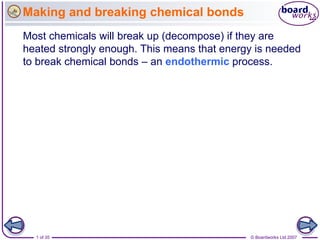
IGCSE 11.1.10
- 1. Making and breaking chemical bonds Most chemicals will break up (decompose) if they are heated strongly enough. This means that energy is needed to break chemical bonds – an endothermic process. 1 of 35 © Boardworks Ltd 2007
- 2. Making and breaking chemical bonds Most chemicals will break up (decompose) if they are heated strongly enough. This means that energy is needed to break chemical bonds – an endothermic process. 2 of 35 © Boardworks Ltd 2007
- 3. Making and breaking chemical bonds Most chemicals will break up (decompose) if they are heated strongly enough. This means that energy is needed to break chemical bonds – an endothermic process. energy absorbed 3 of 35 © Boardworks Ltd 2007
- 4. Making and breaking chemical bonds Most chemicals will break up (decompose) if they are heated strongly enough. This means that energy is needed to break chemical bonds – an endothermic process. energy absorbed 4 of 35 © Boardworks Ltd 2007
- 5. Making and breaking chemical bonds Most chemicals will break up (decompose) if they are heated strongly enough. This means that energy is needed to break chemical bonds – an endothermic process. energy absorbed Because bond-breaking is endothermic, bond-making must therefore be exothermic. This means that energy is released when chemical bonds are made. 5 of 35 © Boardworks Ltd 2007
- 6. Making and breaking chemical bonds Most chemicals will break up (decompose) if they are heated strongly enough. This means that energy is needed to break chemical bonds – an endothermic process. energy absorbed Because bond-breaking is endothermic, bond-making must therefore be exothermic. This means that energy is released when chemical bonds are made. 6 of 35 © Boardworks Ltd 2007
- 7. Making and breaking chemical bonds Most chemicals will break up (decompose) if they are heated strongly enough. This means that energy is needed to break chemical bonds – an endothermic process. energy absorbed Because bond-breaking is endothermic, bond-making must therefore be exothermic. This means that energy is released when chemical bonds are made. energy released 7 of 35 © Boardworks Ltd 2007
- 8. Making and breaking chemical bonds Most chemicals will break up (decompose) if they are heated strongly enough. This means that energy is needed to break chemical bonds – an endothermic process. energy absorbed Because bond-breaking is endothermic, bond-making must therefore be exothermic. This means that energy is released when chemical bonds are made. energy released 8 of 35 © Boardworks Ltd 2007